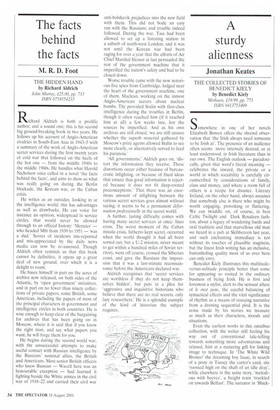The facts behind the facts
M. R. D. Foot
THE HIDDEN HAND by Richard Aldrich John Murray, £25.00, pp. 733 ISBN 0719554233 Richard Aldrich is both a prolific author, and a sound one; this is his second big ground-breaking book in two years. He follows up his account of Anglo-American rivalries in South-East Asia in 1943-5 with a summary of the work of Anglo-American secret services during the first twenty years of cold war that followed on the heels of the hot one — from the middle 1940s to the middle 1960s. He handles what Harold Nicholson once called in a novel 'the facts behind the facts', and aims to show us what was really going on during the Berlin blockade, the Korean war, or the Cuban crisis.
He writes as an outsider, looking in at the intelligence world; this has advantages as well as drawbacks. He can voice for instance an opinion, widespread in service circles, that would never be allowed through to an official history: 'Menzies' — who headed MI6 from 1939 to 1951 — 'was a dud.' Scores of incidents mis-reported and mis-appreciated by the daily news media can now be re-assessed. Though Aldrich often reminds us that this book cannot be definitive, it opens up a great deal of new ground, over which it is a delight to roam.
He bases himself in part on the acres of archive now released, on both sides of the Atlantic, by 'open government' initiatives, and in part on no fewer than ninety collections of private papers, some British, some American, including the papers of most of the principal characters in government and intelligence circles in both countries. He is wise enough to keep clear of the bargaining for archives that has been going on in Moscow, where it is said that if you know the right man, and say what papers you want, he will forge them for you.
He begins during the second world war, with the unsuccessful attempts to make useful contact with Russian intelligence by the Russians' nominal allies, the British and Americans. Most senior British officers who knew Russian — Wave11 here was an honourable exception — had learned it fighting beside the White armies in the civil war of 1918-22 and carried their civil war anti-bolshevik prejudices into the new field with them. This did not bode an easy run with the Russians; and trouble indeed followed. During the war, Tass had been allowed to set up a listening station in a suburb of north-west London; and it was not until the Korean war had been raging for over a year that the efforts of Air Chief Marshal Slessor at last persuaded the rest of the government machine that it imperilled the nation's safety and had to be closed down.
Worse trouble came with the now notorious five spies from Cambridge, lodged near the heart of the government machine, one of them, Maclean, working on the inmost Anglo-American secrets about nuclear bombs. Thy provided Stalin with first-class intelligence during the troubles in Berlin, though it often reached him (if it reached him at all) a few weeks late, lest the sources be imperilled. And as his own archives are still closed, 'we are still unsure whether the superb material gathered by Moscow's prize agents allowed Stalin to see more clearly, or alternatively served to feed his paranoia.'
'All governments,' Aldrich goes on, 'distort the information they receive. These distortions occur either because of bureaucratic infighting, or because of fixed ideas that ensure that good information is rejected because it does not fit deep-rooted preconceptions.' That there was an enormous amount of infighting between the various secret services goes almost without saying; it seems to be a permanent deformation professionelle in the secret world.
A further, lasting difficulty comes with having many secret services at once: lines cross. The worst moment of the Cuban missile crisis, hitherto kept secret, occurred when the world thought it had all been sorted out; but a U-2 mission, never meant to get within a hundred miles of Soviet territory, went off course, crossed the Siberian coast, and gave the Russians the impression that it was a last-minute reconnaissance before the Americans declared war.
Aldrich recognises that 'secret services are worthless if they do not keep themselves hidden', but puts in a plea for 'aggressive and inquisitive historians who believe that there are no real secrets, only lazy researchers.' He is a splendid example of the kind of historian the subject requires.


























































 Previous page
Previous page